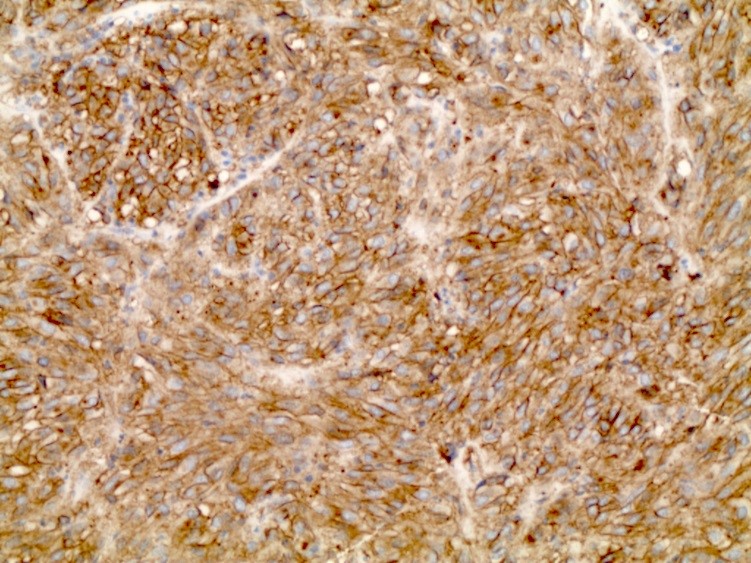DOG1 monoclonal antibody (K9 clone) by IHC
DOG1 monoclonal antibody (K9 clone) by IHC-12376 - Technical only, 12379 - Technical & interpretation
DOG1 monoclonal antibody (K9 clone) by IHC
12376 - Technical only, 12379 - Technical & interpretation
LAB12376
LAB12379
LAB12379
All IHC stains will include a positive control tissue
- DOG1 has a reported sensitivity of 94% to 100% in gastrointestinal stromal tumors (GIST)
- DOG1 is more sensitive than CKIT (CD117) in detecting GIST tumors of gastric origin, tumors with epithelioid morphology, and tumors harboring PDGFRA mutations
- Thus, DOG1 staining may be a useful adjunct to confirm an epithelioid or gastric GIST and discriminate from leiomyosarcomas (which can be CKIT positive)
Note: approximately 1-2% of GISTS of the GI tract will be negative for both DOG1 and CKIT
Tissue
Submit a formalin-fixed, paraffin-embedded tissue
Formalin-fixed, paraffin-embedded (FFPE) tissue block
FFPE tissue section mounted on a charged, unstained slide
Ambient (preferred)
- Unlabeled/mislabeled block
- Insufficient tissue
- Slides broken beyond repair
AHL - Immunohistochemistry
Mo - Fr
1 - 2 days
Immunohistochemical staining and microscopic examination
If requested, an interpretive report will be provided
Specifications
- Calcium-regulated chloride channel protein
Staining pattern
- Membranous and cytoplasmic staining
Expected normal staining:
- DOG1 is positive in the following normal tissues: Cajal cells of the gastrointestinal tract, luminal surface of the gastric mucosa, salivary gland, pancreatic acini, intrahepatic bile ducts, gallbladder, bladder, breast and prostate myoepithelial/basal cells
- DOG1 positivity has been described in rare cases of leiomyosarcoma, peritoneal leiomyomatosis, synovial sarcoma, and desmoplastic melanoma
- DOG1 positivity has also been described in the following carcinomas/epithelial neoplasms: hepatocellular carcinoma, basal cell adenoma, adenoid cystic carcinoma, lung adenocarcinoma, and GI tract carcinomas.
- DOG1 positivity has been described in dendritic-shaped Cajal cells which can colonized intramural GI leiomyomas
References
- Espinosa et al. A Novel monoclonal antibody against DOG1 is a sensitivity and specific marker for gastrointestinal stromal tumors; Am J Surg Pathol 2008;32(2):210-218.
- Miettinen et al. DOG1 antibody in the differential diagnosis of gastrointestinal stromal tumors. Am J Surg Pathol 2009;33(9):1401-1407.
- Hwang et al. DOG1 antibody is highly sensitive and specific marker for gastrointestinal stromal tumors in cytology cell blocks. Am J Clin Pathol 2011;135:448-453.
- Lopes et al. DOG1 for the diagnosis of gastrointestinal stromal tumor (GIST): Comparison between 2 different antibodies. Appl Immunohistochem Mol Morphol 2010;18(4):333-337.
88342 - 1st stain
88341 - each additional stain
88341 - each additional stain
02/07/2018
10/17/2018
01/12/2024
